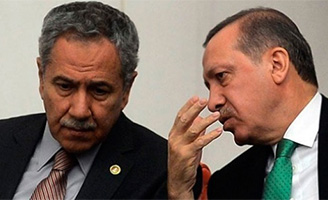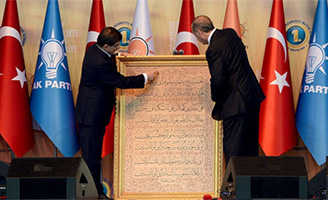The Turkish Islamists See the Sunni Nation as the Solution to the Kurdish Problem
By Fatih Yaşlı (vol. 8, no. 7 of the Turkey Analyst)
Historically, Turkey’s Islamists have taken a view of the Kurdish problem that has made them the tacit allies of the Kurds, both standing in opposition to the founding ideology of the Turkish republic. As the Islamists see it, the Kurds are a pious, conservative people that together with the Turks constitute the “Muslim nation.” For the AKP, the solution to the Kurdish problem is spelled “Islamic fraternity.” This is the assumption that ultimately sustains the negotiations that the AKP has been conducting with the Kurdish political movement.
Battles and Wars: Bracing for Erdoğan’s Long Goodbye
By Gareth Jenkins (vol. 8, no. 6 of the Turkey Analyst)
On March 20, 2015, Turkish President Recep Tayyip Erdoğan publicly criticized the announcement by the ruling Justice and Development Party (AKP) that it was planning to establish a monitoring committee to oversee discussions about reforms on the Kurdish issue. On March 21, 2015, Government Spokesperson Bülent Arınç bluntly told Erdoğan not to interfere in the running of the government. Arınç repeated his admonition the following day. It was the first time that a leading member of the AKP had issued such an outspoken public challenge to Erdoğan’s authority.

The AKP’s Ideological Hegemony Means More than Internal Party Disputes
By Toni Alaranta (vol. 8, no. 6 of the Turkey Analyst)
It is crucial to appreciate that the main components of the AKP’s ideological “winning bloc” remain in place, even when leading representatives of the party clash. By conjuring the specter of an imagined, threatening “domestic other,” essentialist Islamic conservative nationalism has been able to form and sustain a collective political actor that is not going to be easily undermined by day-to-day intra-party polemics.

What the Columnists Say
Abdülkadir Selvi in Yeni Şafak asks what’s happening to the AKP, and warns that the spell of the party as the symbol of stability is being broken. Orhan Bursalı in Cumhuriyet writes that the exposure of an internal power struggle no doubt creates certain question marks in the minds of voters, but that the impact on voter behavior is marginal. What matters more, he writes, are the mounting economic problems and the impression that the government is surrendering to PKK. Kadri Gürsel in Milliyet writes that AKP will lose either Kurdish voters or Turkish nationalists in the upcoming elections, depending on whether it is Erdoğan or the government that sets the course, and that regardless, Erdoğan’s dreams of presidential rule is going to be the casualty. Oya Baydar on the t24 news site draws attention to a belligerent ultimatum that was issued by the General Staff in response to the Newroz message of PKK leader Abdullah Öcalan. Baydar warns that military tutelage is making a comeback.

What the Columnists Say
Aslı Aydıntaşbaş in Milliyet writes that it’s not certain that pro-Kurdish HDP will cross the ten percent threshold to parliament, but she notes that polls indicate an upward trend. However, HDP will have to be wary of provocations and assure the Turkish public beforehand that it has got nothing to do with any acts of violence that may be staged during the run-up to the election in June. Oya Baydar on the t24 news site writes that the sine qua non for electoral success is that the HDP makes sure to forcefully deny and dispel the rumors that certain circles are spreading that the HDP has come to an agreement with Erdoğan to introduce a presidential system. Ali Bayramoğlu in Yeni Şafak predicts that the elections are going to confirm that both AKP and HDP benefit from the headway that is being made in the solution process. Ahmet İnsel in Radikal writes that the HDP has the potential to become the Freedom Movement for Turkey, provided that the line of its co-chairman Selahattin Demirtaş is not sabotaged by forces from within the Kurdish political movement itself.








